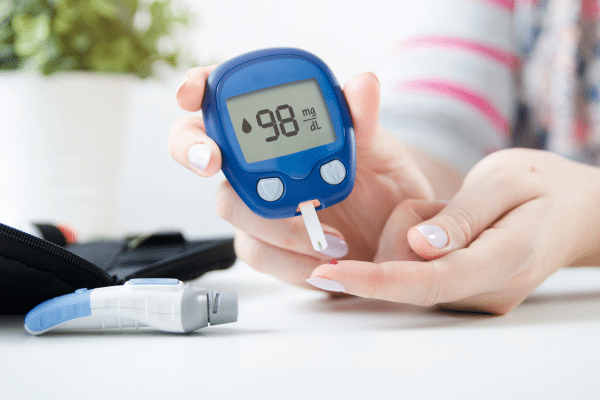Maintaining healthy blood sugar levels is crucial for overall well-being. Elevated blood sugar can lead to serious health issues, including diabetes, cardiovascular disease, and nerve damage. This blog post explores practical strategies to manage and lower blood sugar levels. Emphasizing lifestyle modifications, the upcoming sections will delve into the benefits of regular exercise, the importance of dietary fiber, and effective stress management techniques. Each strategy is a step towards a healthier life, offering a proactive approach to managing blood sugar levels.
Contents
Exercise Regularly

Engaging in physical activity is a cornerstone of blood sugar management. Regular exercise helps increase insulin sensitivity, meaning the body’s cells can use the available sugar in the bloodstream more effectively. This process helps reduce blood sugar levels. Additionally, when muscles contract during activity, they use sugar as a source of energy, effectively lowering blood sugar levels. Whether it’s brisk walking, swimming, or cycling, incorporating a variety of exercises into the routine can keep it enjoyable and sustainable.
Physical activity doesn’t have to be daunting or time-consuming. Even short bouts of exercise can accumulate to significant health benefits. It’s recommended to aim for at least 150 minutes of moderate aerobic activity or 75 minutes of vigorous activity per week, coupled with muscle-strengthening activities on two or more days. Starting with small, manageable goals and gradually increasing intensity and duration can make the process more approachable. Remember, consistency is key – making exercise a regular part of the daily routine can lead to long-lasting benefits for blood sugar control.
Eat More Fiber

Fiber plays a pivotal role in blood sugar management. It slows the digestion process and the rate of sugar absorption, helping to maintain stable blood sugar levels. Soluble fiber, in particular, can have a significant impact. It forms a gel-like substance in the gut, which helps to slow down food absorption. This process ensures a gradual release of sugar into the bloodstream, preventing sudden spikes in blood sugar levels. High-fiber foods, such as fruits, vegetables, legumes, and whole grains, should be integral components of the diet.
Incorporating more fiber into meals is simpler than it might seem. Starting the day with a high-fiber breakfast, like oatmeal or a smoothie with fruits and leafy greens, can set a positive tone for the day. Snacking on nuts, seeds, or raw vegetables instead of processed snacks not only increases fiber intake but also provides essential nutrients. Replacing refined grains with whole grains and adding legumes to salads, soups, or wraps can significantly boost daily fiber intake. Embracing these dietary changes can lead to improved blood sugar levels and provide numerous other health benefits.
Manage Your Stress

Stress can have a profound impact on blood sugar levels. When under stress, the body releases hormones such as cortisol and adrenaline, which can cause blood sugar levels to rise. This response is a part of the “fight or flight” mechanism, which historically helped humans face threats. However, in today’s world, chronic stress keeps these hormones elevated, disrupting blood sugar control. Beyond direct hormonal effects, stress can lead to poor dietary choices and reduced physical activity, further exacerbating blood sugar issues.
To mitigate the impact of stress on blood sugar, incorporating stress management techniques into daily life is essential. Practices like mindfulness, meditation, and yoga have been shown to reduce stress hormone levels, promoting relaxation and improving overall well-being. Regular physical activity, while beneficial for blood sugar control, also helps in reducing stress. Additionally, ensuring adequate, quality sleep each night can help regulate the hormones that influence blood sugar levels. By adopting a proactive approach to stress management, it’s possible to maintain better control over blood sugar levels and enhance overall health.
Monitor Carbohydrate Intake

Understanding and managing carbohydrate intake is essential for blood sugar control. Carbohydrates have a direct impact on blood sugar levels more than fats and proteins. Knowing the types and amounts of carbohydrates consumed can help manage blood sugar levels effectively. It’s beneficial to focus on complex carbohydrates found in whole grains, fruits, and vegetables, as they are broken down more slowly and have less immediate impact on blood sugar compared to simple carbohydrates found in sugary snacks and drinks.
Counting carbohydrates can be an effective way to manage blood sugar, especially for individuals on insulin or certain diabetes medications. It involves keeping track of the number of carbohydrate grams in meals and snacks to stay within a target range for each meal. Understanding the glycemic index, which indicates how quickly a food item may raise blood sugar, can also aid in making more informed choices. A balanced diet with a proper mix of carbohydrates, fats, and proteins, along with consistent meal timing, contributes to stable blood sugar levels.
Stay Hydrated

Proper hydration is key to maintaining blood sugar levels. Drinking enough water helps the kidneys flush out excess sugar through urine. Moreover, water does not raise blood sugar levels, making it the best choice for staying hydrated. Adequate water intake can prevent dehydration and help the body function at optimal levels. It’s advised to avoid beverages high in sugar and caffeine, as they can lead to blood sugar spikes and dehydration, respectively.
To ensure adequate hydration, it’s recommended to drink water regularly throughout the day and adjust intake based on individual needs, activity level, and weather conditions. Recognizing the signs of dehydration, such as thirst, dry mouth, and fatigue, is crucial. Replacing sugary drinks with water, herbal teas, or sparkling water with a splash of lemon or lime can make staying hydrated more enjoyable. By prioritizing hydration, one can support blood sugar control and overall health.
Get Enough Quality Sleep

Quality sleep is a frequently overlooked but critical component of blood sugar control. Lack of sleep can disrupt hormones that regulate appetite and insulin, the hormone that controls blood sugar levels. This disruption can lead to increased appetite and weight gain, making blood sugar harder to manage. Ensuring seven to nine hours of uninterrupted sleep each night can help maintain hormonal balance, aiding in blood sugar control.
Creating a conducive sleep environment is crucial. This means maintaining a cool, quiet, and dark room, and establishing a regular bedtime routine to signal to the body that it’s time to wind down. Limiting screen time before bed, avoiding caffeine and heavy meals in the evening, and engaging in relaxing activities can promote better sleep. Prioritizing quality sleep is not just about feeling rested; it’s a vital part of maintaining balanced blood sugar levels.
Regularly Monitor Blood Sugar Levels

Keeping track of blood sugar levels is crucial for understanding how different factors like food, activity, and stress affect them. Regular monitoring can provide insight into patterns and trends, which can inform decisions about diet, exercise, and medication. It empowers individuals to take active control of their health and make adjustments as needed to maintain optimal blood sugar levels.
Monitoring doesn’t have to be cumbersome. With the advancement in technology, there are various methods available, from traditional blood glucose meters to continuous glucose monitors (CGMs), which offer real-time insights into blood sugar patterns. Recording these readings and discussing them with a healthcare provider can lead to a more personalized approach to managing blood sugar. This proactive engagement is a cornerstone of effective diabetes management and overall health maintenance.
The Bottom Line
Managing blood sugar is a multifaceted approach that requires consistent effort and attention to various aspects of life. Regular exercise, a balanced diet rich in fiber, proper hydration, quality sleep, and stress management are all integral parts of maintaining healthy blood sugar levels. Monitoring carbohydrate intake and regularly checking blood sugar levels can provide valuable insights and help tailor a personal management plan. Embracing these lifestyle changes may seem challenging at first, but the benefits for blood sugar control and overall health are invaluable. It’s important to approach these changes gradually and seek support from healthcare professionals to ensure a successful and sustainable transition to a healthier lifestyle.


